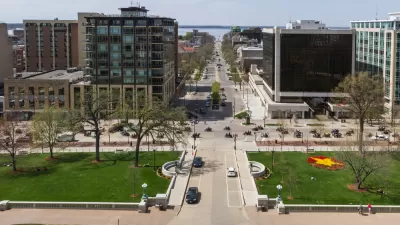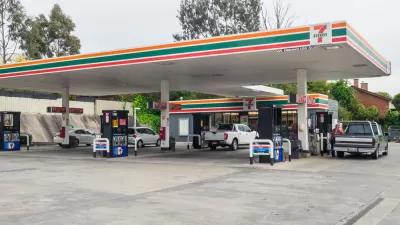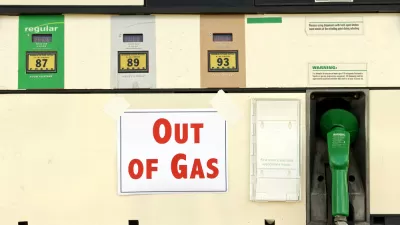Without an automatic adjustment for gas taxes, revenue from the tax declines due to increasing fuel efficiency standards while road maintenance and construction costs increase due to inflation. Witness Wisconsin's woes.

Like most states, Wisconsin relies to a great extent on user fees, particularly the gas tax, to fund its roads. [How does your state pay for its roads?]
But that share has been declining since the legislature abolished the practice of automatically adjusting its gas tax in 2006, now stuck at 32.9 cents per gallon for over 11 years. [When did your state last increase its gas tax?]
Furthermore, it's not only causing transportation headaches for the legislature, it's also holding up the budget process, reports Marti Mikkelson for WUWM (Milwaukee Public Radio–listen here).
“Up until that point, there had been an automatic increase based on several different variables and there was always a little more money coming in. Once you eliminated those automatic increases, then you essentially ended up with a stagnant revenue pool,” Wisconsin Taxpayers Alliance spokesman David Callende says.
Republican Gov. Scott Walker has not been helpful. "When he took office in 2011, he made it clear, that there would be no increases in registration fees -- or gas taxes -- in his budgets," adds Mikkelson.
Unlike some states, like California, where hiking taxes often comes down to a partisan divide, in Wisconsin, a Republican trifecta, an "ideological split between the GOP leaders in the Assembly and Senate complicates the search for answers," according to JR Ross of wispolitics.com.
Two user fees not taken off the table are adding road tolls near the state borders, with the idea of catching out-of-state motorists, and adding a vehicle-miles-traveled fee for heavy trucks, aka weight distance tax, both described here last month.
A proposal to add a sales tax to fuel purchases and reduce the gasoline excise tax posted in May apparently failed.
Wisconsin has plenty of company
According to a June 28 publication by the Institute on Taxation and Economic Policy (ITEP), "thirty states and the federal government levy fixed-rate gas taxes where the tax rate does not change even when the cost of infrastructure materials rises or when drivers transition toward more fuel-efficient vehicles and pay less in gas tax."
However, it's not always easy legislating automatic increases to the gas tax, as Massachusetts lawmakers discovered in 2014.
Hat tip to AASHTO Daily Transportation Update
FULL STORY: Why is Transportation Such a Stickler in The Wisconsin State Budget?

Maui's Vacation Rental Debate Turns Ugly
Verbal attacks, misinformation campaigns and fistfights plague a high-stakes debate to convert thousands of vacation rentals into long-term housing.

Planetizen Federal Action Tracker
A weekly monitor of how Trump’s orders and actions are impacting planners and planning in America.

In Urban Planning, AI Prompting Could be the New Design Thinking
Creativity has long been key to great urban design. What if we see AI as our new creative partner?

King County Supportive Housing Program Offers Hope for Unhoused Residents
The county is taking a ‘Housing First’ approach that prioritizes getting people into housing, then offering wraparound supportive services.

Researchers Use AI to Get Clearer Picture of US Housing
Analysts are using artificial intelligence to supercharge their research by allowing them to comb through data faster. Though these AI tools can be error prone, they save time and housing researchers are optimistic about the future.

Making Shared Micromobility More Inclusive
Cities and shared mobility system operators can do more to include people with disabilities in planning and operations, per a new report.
Urban Design for Planners 1: Software Tools
This six-course series explores essential urban design concepts using open source software and equips planners with the tools they need to participate fully in the urban design process.
Planning for Universal Design
Learn the tools for implementing Universal Design in planning regulations.
planning NEXT
Appalachian Highlands Housing Partners
Mpact (founded as Rail~Volution)
City of Camden Redevelopment Agency
City of Astoria
City of Portland
City of Laramie





























